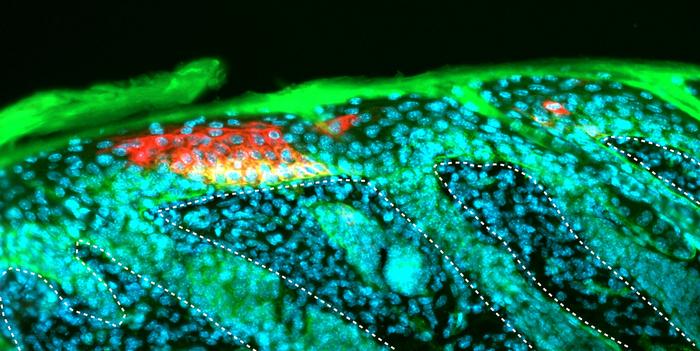How does a normal cell in the body develop into an aggressive cancer cell? According to the central tumor model, cancer develops in an evolutionary process. When randomly distributed mutations in cancer genes accumulate in single cells, this gradually perturbs cell division and other cellular properties until the control programs get out of hand. These cells therefore proliferate faster than its neighboring cells, leading to uncontrolled multiplication – so-called clonal expansions of the mutated cells. The clonal expansion phase in superficially normal appearing tissues is the first of two key phases in tumorigenesis.

Credit: Peter Renz, University of Zurich
How does a normal cell in the body develop into an aggressive cancer cell? According to the central tumor model, cancer develops in an evolutionary process. When randomly distributed mutations in cancer genes accumulate in single cells, this gradually perturbs cell division and other cellular properties until the control programs get out of hand. These cells therefore proliferate faster than its neighboring cells, leading to uncontrolled multiplication – so-called clonal expansions of the mutated cells. The clonal expansion phase in superficially normal appearing tissues is the first of two key phases in tumorigenesis.
Distinct gene program drives cancer development
An international research team led by Ataman Sendoel from the Institute for Regenerative Medicine (IREM) at the University of Zurich (UZH) uncovered that a distinct signaling program not only acts as a general driver of clonal expansions in human epithelia such as the skin and the mucous membranes in esophagus, bladder or colon. It also contributes to the cells’ predisposition for tumor initiation and is sufficient to mediate invasive properties of epidermal stem cells. «Our results show that the TNF-α signaling program acts as a main driver for the transformation of normal epithelial cells to malignant cancer cells in the key phases of tumorigenesis», Sendoel adds.
Clonal expansions were traditionally seen as a precursor to cancer. The mutated cell clones can take over large areas of a tissue, effectively remodeling entire organs. However, recent research has revealed a more complex picture: Clonal expansions are surprisingly frequent in aging human epithelia. In fact, human epithelial tissues are mosaics, consisting of areas dominated by groups of cells originating from a single epithelial cell. But clonal expansions are not always harmful. Sometimes they can even help to prevent tumors.
150 cancer genes in the whole epithelial tissue analyzed
To elucidate why only certain epithelial cell clones eventually transform into malignant tumors, the researchers took a detailed look at epithelial cancers – like squamous cell carcinoma, the second most common malignant skin tumor. They developed a single-cell CRISPR technique that allowed them to document clonal expansions in the whole epithelial tissue with single-cell precision. This marks the largest in vivo study of its kind, providing systematic insights into how cancer gene mutations alter cellular behavior. «We focused on the 150 most frequently mutated cancer genes in epithelial tumors and followed their fate during clonal expansion and cancer formation in each cell type by profiling all active genes», Sendoel says.
The team identified a distinct TNF-α (tumor necrosis factor alpha) program, a signaling pathway that plays a crucial role in inflammation and cellular communication. During clonal expansion in normal epithelia, TNF-α signaling is provided by the surrounding environment involving immune cells such as macrophages and helps proliferate cells that have accumulated cancer gene mutations. Once these cells accumulate too many driver mutations, their malignant transformation begins – and the tumor starts. «Interestingly, during cancer formation, some of the cancer cells start to produce their own TNF-α, which promotes the invasion into surrounding tissue, the second crucial step in tumorigenesis», Peter Renz, postdoctoral researcher and lead author of the study explains.
New possibilities for early detection and potential treatment
According to the researchers, understanding the differences and similarities between clonal expansion in normal tissues and tumors may lead to new strategies for early detection, prevention and treatment of these tumor types. «Our findings indicate that targeting the cancer-specific arm of TNF-α signaling might offer a promising therapeutic avenue for patients with epithelial cancers», Sendoel underlines. Besides, the distinct TNF-α signaling also correlates with the tumors’ aggressivity: the more active the cancer-specific gene program is, the shorter are the patient survival rates. The findings therefore provide a potential biomarker for assessing the prognosis of patients with epithelial cancers.
Journal
Nature
Method of Research
Experimental study
Subject of Research
Human tissue samples
Article Title
In vivo single-cell CRISPR uncovers distinct TNF-α programs in clonal expansion and tumorigenesis
Article Publication Date
17-Jul-2024



